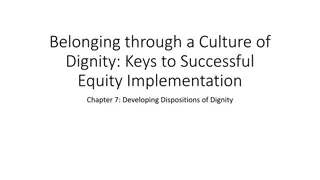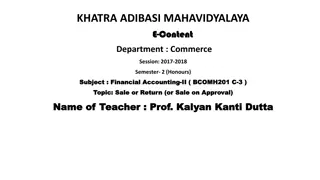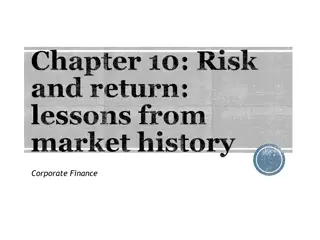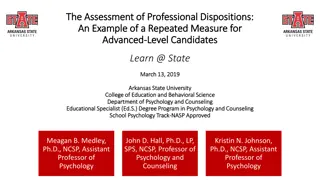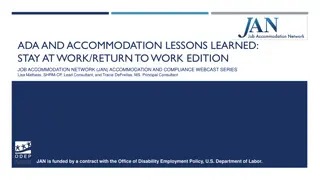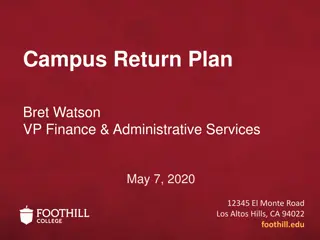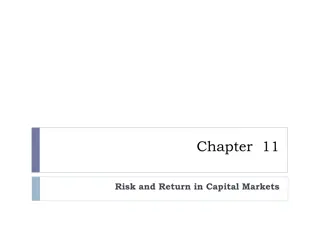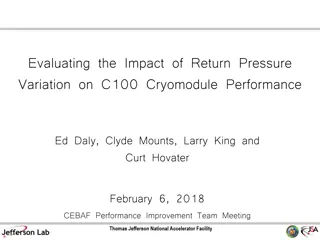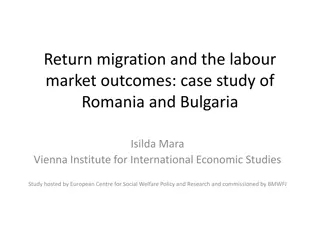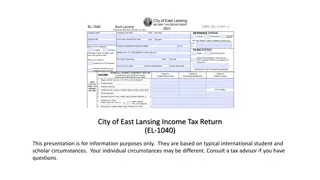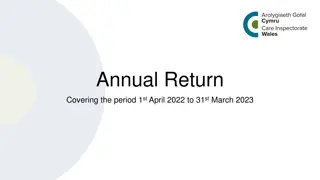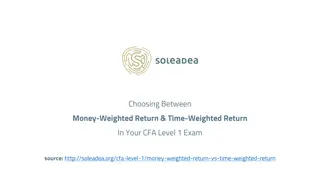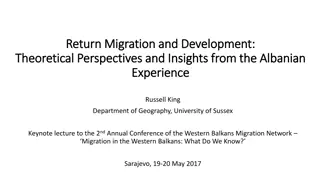Memory Attack Review Overview
This content provides insights on memory attacks, particularly focusing on return-oriented programming and stack canary protection. It explores how stack canaries safeguard against return-oriented programming by detecting buffer overflows and preventing the alteration of return addresses. With a vis
2 views • 32 slides
Best Kindergarten in Beauty World
ELF Preschool provides the Best Kindergarten in Beauty World. The school is committed to implement the latest advancement in early childhood research, methodology and pedagogy. Their learning approach allows pre-schoolers to acquire knowledge, skills and dispositions through lively learning activiti
1 views • 6 slides
Cultivating Dignity: Empowering Personal Growth through Authentic Engagement
Develop your personal dispositions of empathy, patience, openness, and listening to cultivate dignity and belonging. Embrace the discomfort of growth, co-create brave spaces, and embark on the dignity journey to honor yourself and others.
0 views • 16 slides
Sale or Return (or Sale on Approval) in Financial Accounting
In financial accounting, the concept of Sale or Return (or Sale on Approval) involves sending goods to parties with the option to approve, accept, purchase, or return them within a specified time. This system is commonly used for introducing new products, where ownership transfer occurs only upon ac
0 views • 5 slides
Risk and Return in Corporate Finance
Exploring risk and return in market history is crucial for determining appropriate returns on assets. By analyzing dollar returns, percentage returns, holding period returns, and capital market returns, investors can grasp the risk-return tradeoff. Lessons from capital market return history emphasiz
4 views • 18 slides
Lateral Ankle Sprains: Return to Basketball Insights
This presentation discusses the impact of lateral ankle sprains on basketball players, focusing on the need for Return to Sport (RTS) guidelines, the PAASS framework, assessment tests, prevalence, and challenges in managing these injuries in basketball. Emphasis is placed on understanding mechanisms
1 views • 16 slides
Lateral Ankle Sprains Return to Basketball Presentation
This presentation focuses on the return-to-sport guidelines for basketball players after a lateral ankle sprain. It covers the prevalence of ankle sprains in basketball, the PAASS framework for assessment, specific tests for return-to-sport decisions, common impairments, athlete perception, sensorim
6 views • 16 slides
Analysis of Police Shootings of Unarmed Black Males in the US
This research article from the Brookings Institution examines the legal basis for police shootings of unarmed black males in the United States. It discusses national fatal police shootings by officers, the racial breakdown of victims, criminal case dispositions, and high-profile cases involving unar
0 views • 9 slides
Risk and Return in Financial Markets
This chapter delves into the concepts of risk and return in financial markets, exploring the relationship between expected and unexpected returns, systematic and unsystematic risk, and the Security Market Line. It also discusses the impact of announcements and news on stock returns, distinguishing b
1 views • 73 slides
Assessment of Professional Dispositions in School Psychology Education
Assessment of professional dispositions is crucial in school psychology education to meet accreditation standards set by CAEP and NASP. The program at Arkansas State University uses a rating scale to evaluate traits like appearance, reliability, collaboration, and problem-solving abilities. Various
0 views • 6 slides
The Capital Asset Pricing Model (CAPM) for Required Return Calculation
Learn about the Capital Asset Pricing Model (CAPM) and how to calculate the required return on an investment using this model. Explore key concepts such as stock return, market return, beta calculation, and more with a practical example involving Riyad Bank and Tadawul All Shares Index. Utilize dail
2 views • 35 slides
Global Framework for Efficient Asset Recovery Guidelines
The Global Framework for Asset Recovery, guided by the UNCAC, emphasizes returning stolen assets to combat corruption effectively. The UNCAC obligates signatory countries to return funds under specific conditions, promoting transparency and accountability in the asset return process. Stakeholders ad
7 views • 9 slides
Bachelor of Education (Senior Phase and FET Phase) Consumer Studies Program
The Bachelor of Education (Senior Phase and Further Education and Training Teaching) program is a comprehensive qualification for educators preparing to teach grades 7-10. It integrates academic and educational subjects, emphasizing practical understanding, self-reflexivity, citizenship, diverse tea
1 views • 6 slides
Washington State Patrol Record Review & Challenge Guidelines
The Washington State Patrol provides individuals the opportunity to request and review their non-conviction criminal history records. The subject must appear in person with valid identification at a local law enforcement agency or the WSP office. Criminal history information includes arrests, dispos
0 views • 12 slides
ADA and Accommodation Lessons Learned: Stay at Work/Return to Work Edition
Explore the key insights and benefits of Stay-at-Work (SAW) and Return-to-Work (RTW) Programs, relevant laws like the Americans with Disabilities Act (ADA), and the importance of job accommodations in keeping disabled or temporarily impaired workers on the job or facilitating their return to work. U
0 views • 34 slides
District Campus Return Plan Overview
The District Campus Return Plan, led by Bret Watson, VP of Finance & Administrative Services, outlines a phased approach for the safe return of students and staff to campus following state and county guidelines. The plan includes pre-planning, preparing buildings and classrooms, acquiring PPE, imple
0 views • 9 slides
Risk and Return in Capital Markets
This chapter delves into the concepts of risk and return in capital markets, exploring historical trends, tradeoffs, common versus independent risk, and the importance of diversification in stock portfolios. Readers will discover the performance of various types of securities over time and gain insi
0 views • 68 slides
Insights into Mars Sample Return Science Inputs for Landing Site Selection
The Mars Program Office at Jet Propulsion Laboratory has conducted a systematic survey to determine landing site priorities for sample return missions. Insights from the astrobiology and cosmochemistry/petrology communities reveal key interests such as geologic age, rock-water interactions, and dive
0 views • 16 slides
Navigating the Return to Office: Resources and Support
As employees transition back to the office, resources like printable Comfort Cards and employee support tools are available to facilitate a smooth return. Additionally, the introduction of the Calm app as a new benefit aims to support mental health and well-being. Top tips for relieving stress at wo
0 views • 6 slides
Dispositions: The Conditional Analysis Approach
Explore the concept of dispositions, also known as capacities or causal powers, and the traditional Conditional Analysis (CA) approach as a dominant account of dispositions. Learn about the features and examples of dispositions such as fragility, solubility, mass, and charge, and how objects exhibit
0 views • 25 slides
Impact of Return Pressure Variation on C100 Cryomodule Performance
The performance of SRF cavities, specifically the C100 Cryomodule (CM), is influenced by the local surface resistance, bulk Nb temperature, and pressure variations. This study evaluates how return pressure variation affects the heat transfer limitations within the C100 CM, impacting cavity performan
0 views • 13 slides
Internal Rate of Return (IRR) in Investments
Internal Rate of Return (IRR) is a method used to assess the profitability of potential investments by calculating the discount rate that makes the net present value of an investment zero. It considers the time value of money and helps in comparing projects based on their returns relative to costs.
0 views • 5 slides
Study on Return Migration and Labor Market Outcomes in Romania and Bulgaria
This study examines the impact of return migration on the labor market outcomes of Bulgarian and Romanian migrants, exploring factors influencing their decisions to return, such as labor market structure, monetary incentives, and family motives. The literature review indicates varying skill distribu
0 views • 15 slides
IEEE 802.11-24/411r0 TXOP Return in C-TDMA
This document discusses the TXOP return mechanism in C-TDMA operation for IEEE 802.11 networks. It explores the importance of timely TXOP return for efficient utilization of medium and proposes considerations for implementing TXOP return in C-TDMA. Various TXOP return scenarios and frame types are a
0 views • 11 slides
City of East Lansing Income Tax Return Guide
This presentation provides information on filing an income tax return (EL-1040) for the City of East Lansing, focusing on typical international student and scholar circumstances. It covers who is required to file, considerations for physically present work, necessary documents, entering personal inf
0 views • 20 slides
Enhancing Missing Children Process in Surrey: Importance of Return Home Interviews
The missing children process in Surrey emphasizes the significance of Return Home Interviews (RHIs) within 72 hours of a child's return home. RHIs provide insights into the child's perspective, vulnerabilities, and necessary support. Police involvement, prevention checks, and intelligence gathered f
0 views • 30 slides
Annual Return Submission Guide for CIW Registered Providers
Understand who needs to submit an Annual Return, the timescales involved, access levels for submission, preparation tips, and key information to review before submission for providers registered with CIW. Access the Annual Return via your CIW Online Account and ensure accurate details for a smooth c
0 views • 8 slides
Comprehensive Return-to-Work Program at University of Georgia
The Return-to-Work Program at the University of Georgia aims to help employees resume productive employment smoothly after a work-related injury or illness. It focuses on gradually overcoming medical restrictions and complying with relevant laws such as the ADA and FMLA. The program involves various
0 views • 18 slides
Choosing Between Money-Weighted Return & Time-Weighted Return in CFA Level 1 Exam
Learn the differences and implications of Money-Weighted Return (MWRR) and Time-Weighted Return (TWRR) for your CFA Level 1 exam. Understand how to calculate these returns, their characteristics, and when each method is appropriate. Clear your calculator before computations, and remember the key tip
0 views • 12 slides
Phased Approach for Safe Return to Work Plan
Employing a multi-phased approach, this plan aims to safely bring employees back to work starting when stay-at-home orders are lifted and safety protocols are in place. High-risk employees will be managed carefully, focusing on distance and density issues while implementing top-notch safety measures
0 views • 6 slides
The Investment Process and Rate of Return
Investors choose to invest by saving instead of spending to trade off present consumption for larger future consumption. The rate of return on an investment is measured by factors such as the pure rate of interest, time value of money, inflation impact, and risk premium. Investments involve committi
0 views • 41 slides
Markowitz Risk-Return Optimization
Modern portfolio theory, introduced by Harry Markowitz, aims to maximize expected return while managing risk. Efficient portfolios are represented by points on the efficient frontier, diversifying investments for optimal risk-return trade-offs. The risk-expected return relationship is depicted graph
0 views • 16 slides
Risk and Return in Capital Markets
Delve into the world of capital markets with Professor Droussiotis as you explore the concepts of risk and return. Discover how to measure expected return, quantify risk, and make strategic investment decisions. Learn about the factors influencing the value line in finance, including various risks a
0 views • 17 slides
Information Commissioner's Briefing and Annual Return Overview
The briefing on Monday, 7th December 2020, covers the 2020 ICO Annual Return, PATI Act requirements, Information Commissioner's mandate and approach, PATI Act details, and the purposes of the 2020 ICO Annual Return. The session includes discussions on public authorities' obligations, statistics subm
0 views • 17 slides
Fall/Winter Test Administration Return Instructions 2022
Organize test materials for the Fall/Winter PM1, EOC, and Reading Retakes school coordinators return with specific instructions for administration setup, seating charts, and required items. Ensure proper organization by test type and school level for efficient storage and administration. Includes de
0 views • 10 slides
Risk and Return Assessment in Financial Management
This comprehensive presentation explores the intricacies of risk and return assessment in the realm of financial management. Delve into understanding risk concepts, measuring risk and return, major risk categories, and the impact of risk aversion on investment decisions. Gain insights into the manag
2 views • 62 slides
The Hero's Journey: A Path of Transformation and Return
Embark on a journey of separation, transformation, and return to become heroic. Discover the stages from the Call to the Return, facing challenges, undergoing transformation, and ultimately returning enriched and enlightened. Examples from literature and movies illustrate this universal narrative of
0 views • 29 slides
Psalm 117: A Short Psalm of Praise and Return
The shortest Psalm in the Bible, Psalm 117 focuses on praising the Lord and reflecting on the return of the Jews to rebuild the temple in Jerusalem. It highlights God's merciful kindness and enduring truth. The historical context includes Cyrus allowing the Jews to return, the challenges faced durin
0 views • 26 slides
Return Migration and Development: Theoretical Perspectives and Insights from the Albanian Experience
Keynote lecture by Russell King at the 2nd Annual Conference of the Western Balkans Migration Network discussing the relationship between return migration and development. Topics include definitions and measures of migration and development, unpacking the migration-development nexus, theorizing retu
1 views • 20 slides
Return Dispositions and Remote Returns Process in Warehousing
Explore the concept of return dispositions like NRFI, RFI, UNS, and UNSNWT in warehouse management, along with insights into Remote Returns Process (RRP) nodes and Non-RRP nodes. Learn about Regular Returns, LPNs, and the choice between consolidating returns with LPNs for efficiency. Understand the
0 views • 11 slides


